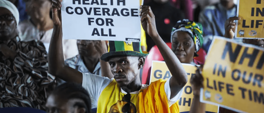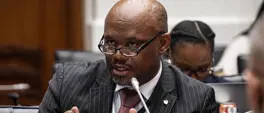Groenewald suggests corporal punishment be revisited to alleviate overcrowding in prisons
Lindsay Dentlinger
2 July 2025 | 5:33The practice was outlawed in prisons in 1996 by an act of Parliament.

Correctional Services Minister Pieter Groenewald delivering his budget vote address in the Good Hope Chamber on 1 July 2025. Picture: Parliament/Phando Jikelo
CAPE TOWN - Minister of Correctional Services Pieter Groenewald has suggested corporal punishment be revisited to alleviate overcrowding in prisons by those who can’t afford to pay the minimum amount of bail.
The practice was outlawed in prisons in 1996 by an act of Parliament.
However, delivering his budget vote in the National Assembly on Tuesday, Groenewald said overcrowding remains a challenge, exacerbated by those who can’t afford to pay small amounts of bail.
But despite the limited accommodation, Groenewald has vowed to enforce his strict stance on parole, particularly for those sentenced to life in prison.
Groenewald said after a year at the helm of Correctional Services, he’s not about to sugarcoat the myriad problems faced in managing the country’s prisons.
Chief among these is overcrowding, with over 60,000 accused persons waiting to stand trial, while over 2,000 of them can’t afford a bail of under R1,000.
“We must start a debate to say: shouldn’t we bring back corporal punishment?”
Groenewald said completing all rehabilitation courses is not a guarantee of being granted parole, particularly for those serving a life sentence.
“When I receive a psychological report or a criminologist report and the risk of re-offending is medium to high, I will not approve any parole for that specific case.”
The minister added that he’s looking at ways of sending foreign nationals back to their countries of origin to serve their prison sentences, while immediately deporting those who are freed upon completing their sentences.
Get the whole picture 💡
Take a look at the topic timeline for all related articles.













